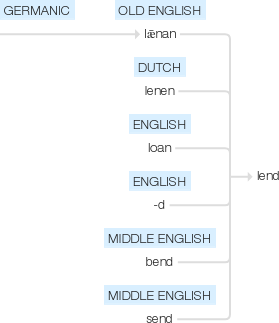Lend
Old English lǣnan, of Germanic origin; related to Dutch lenen, also to loan1. The addition of the final -d in late Middle English was due to association with verbs such as bend and send .
wiktionary
From earlier len (with excrescent -d, as in sound, round, etc.), from Middle English lenen, lænen, from Old English lǣnan(“to lend; give, grant, lease”), from Proto-West Germanic *laihnijan, from Proto-Germanic *laihnijaną(“to loan”), from Proto-Germanic *laihną(“loan”), from Proto-Indo-European *leykʷ-(“to leave, leave over”).
Cognate with Scots len, lend(“to lend”), West Frisian liene(“to lend, borrow, loan”), Dutch lenen(“to lend, borrow, loan”), Swedish låna(“to lend, loan”), Icelandic lána(“to lend, loan”), Icelandic léna(“to grant”), Latin linquō(“quit, leave, forlet”), Ancient Greek λείπω(leípō, “leave, release”). See also loan.
From Middle English lende (usually in plural as lendes, leendes, lyndes), from Old English lendenu, lendinupl(“loins”), from Proto-Germanic *landijō, *landį̄(“loin”), from Proto-Indo-European *lendʰ-(“loin, kidney”). Cognate with Scots lend, leynd(“the loins, flank, buttocks”), Dutch lendenen(“loins, reins”), German Lenden(“loins”), Swedish länder(“loins”), Icelandic lendar(“loins”), Latin lumbus(“loin”), Russian ля́двея(ljádveja, “thigh, haunch”).
etymonline
lend (v.)
"grant temporary possession of," late 14c., from past tense of Old English lænan "to grant temporarily, lease out, make loans, lend money at interest," from Proto-Germanic *laihwnjan, verb derived from *loikw-nes-, the prehistoric source of Old English læn "gift" (see loan (n.)). Compare Dutch lenen, Old High German lehanon, German lehnen, all verbs derived from nouns. In Middle English the past tense form, with terminal -d, became the principal form on analogy of bend, send, etc. To lend an ear "listen" is from late 14c.
lend (n.)
"a loan," 1570s, from lend (v.). OED describes it as Scottish and Northern.
